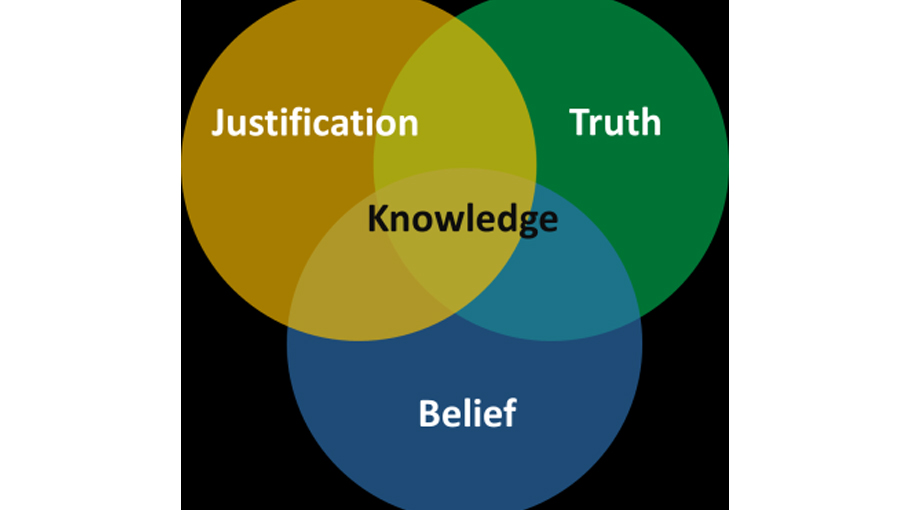The unveiled truth behind knowledge and belief

Mankind has looked up to the skies from its days of birth to the present and wondered through the ages about what lies beyond the limits of the horizon that is yet to be explored.
However, in contrast to earlier beliefs of gods flying over the universe, mankind now has discovered the tool named as “science” and rely solely on it to explain the mechanisms of the unknown territory.
Welcome to 21st century, you are now living in the modern era of science. Earlier beliefs have still kept their belief of gods but majority now believe in science or more commonly perceived as “knowledge”.
Then again, what’s the difference between belief and knowledge? Why is believing in gods exist known as “belief” and yet, flying masses of gases which burn for millions of years known as “knowledge”?
Quite an interesting theory, isn’t it? Well then, allow me the privilege to present to you the fabrications of the man-made objective reality.
The man-made objective reality is a vast ocean of secrets. It is malleable and can be explained in a liquid state to recognize its flexibility.
According to MIT Technology Review, objective reality means that something that is rendered formless unless recognized by a consciousness of an individual.
This leads us to a valid assumption stating that it is highly probable for an imaginative reality to be recognized under such circumstances yet existence of an imaginative entity can be brought to light by a constant variable amongst an environment (social and physical included).
For example, before the concept of currency was discovered, humans relied on a system of barter in order to engage in trades. If you were a farmer your crops could be traded for cloths with a tailor or beer from the brewer. In ancient China they started adopting the method of not carrying a bag full of hundreds of items by breaking their backs instead they applied the way of carrying small tokens representing the items they were willing to trade. Eventually these tokens were diverted into abstract circles that could represent a variety of items. Early romans were also paid in salt from which the word developed into “salary”.
However, let me assure you on the fact that not all trades could be conducted by this method. Therefore, mankind once again pulled his magic hat and brought out the idea of creating a currency by which a number of tokens could represent the value of an item and naturally, the idea was initially an imaginative reality which was later solidified into physical reality by the acceptance of the majority in a population.
Yes, an imaginative idea became a reality because mankind accepted it as an existing entity and chose to give it a form.
A belief chosen by the majority of a population suddenly became existing knowledge? To uncover further, let us explore the idea of “belief”
What is belief? A religious term to identify gods? Or just a non-existent entity becoming existing due to mass acceptance of the concept among people?
According to Primmer, Justin (2018), a belief is an attitude that something is the case, or that some proposition about the world is true. However, philosophers deem that a stated belief can be true or false.
Thus, from the statement above we can conclude two main points of belief
- The data from a belief is unreliable (can be true or false)
- The data may not be justified (since there isn’t a valid source/evidence)
Doesn’t it sound like a prediction without any backing? Perhaps so, and the theories represented by people’s belief can be defined the same. Yet, such controversial topics may harm an audience against another since the term “belief” contains an element humans prioritize most and that element includes their emotions and opinions. Religion may be a belief; luck may be a valid representation of belief, Karma may be a belief and the list goes on and on.
But how powerful is this belief? A source of data that is unreliable, not justified and may as well be an imaginative creation by your brain?
Although its existence may be questionable to some but history has well reassured that it is very real. Since the belief inserted by the Church took reins of some of the largest empires ever to exist across history (The Holy Roman empire may be an example) and minor incidents along the way can further prove the validity of such claims.
We may as well take a look into the history of our own country “Bangladesh” since our belief of our mother tongue led millions of civilians and soldiers alike to fight against an armed country using the least given resources and successfully secure a victory.
Belief is indeed one of the deadliest weapon mankind has to equip itself with and yet it is far from being an example of the true power that mankind has in its arsenal. That true power which drives belief to be such a dangerous weapon is known “unity”.
Humans are social beings and rely on team support since communication and strategy to build remains to be our forte (as discussed in Sapiens by Yuval Noah Harari) - “A chimpanzee may physically be stronger than a human. A one-on-one fight would be surely the victory of a chimpanzee however, a thousand vs thousand would be an effortless victory for humans. The difference lies in the ability to communicate and navigate a strategy”. Following the power of unity, belief tends to draw a majority towards it and thus turning into a flawless mechanism following the functions of carrying out the singular purpose intended to be reached. The best example of an entity created by belief would be the term “religion” and that’s also why it’s a topic most people deem to be sensitive about.
We have looked into the power of belief and found an astonishing result but is it the same for knowledge then?
Comparing “belief” and “knowledge” may turn out to be quite an interesting story. According to Oxford Dictionary, knowledge is a familiarity, awareness, or understanding of someone or something, such as facts.
If knowledge is compared to “facts” then allow me to present to you the definition of facts. According to Cambridge Dictionary, fact is a validated information known to have happened or exist for which evidence or a validated source is provided.
Thus, this statement states that an information with validation and source is stated to be a fact and therefore, has been proven to exist and be absolute.
The two main points caught here stands –
1) The data is proved and validated to be truth
2) Universally accepted and justified
In contrast to the previous discussion, how does this sound? Not unreliable and neither can you prove it to be a mere product of your imaginative reality. Then what significance does it represent? The significance of being “absolute certainty” the meaning of an entity that exists with evidence and proof. Thus, this “knowledge” isn’t bound to any temporary chains of “acceptance” either whereas belief can also be temporary accordingly to the satisfaction of the “believers”. So, what does an absolute fact represent about power and reality of it? Just as the skepticism has it’s eye on belief, it also has eyes on “knowledge” as well since “epistemological nihilism” is based on the principal questioning the existence of knowledge further highlighting the power of “true information” which is strong enough to be even questioned as to if it’s real or not and even if it is real, can it be obtained?
What makes “knowledge” so powerful? And is it really powerful? “Knowledge” stands at the pinnacle of power since the dawn of mankind has relied on it. Unity can be driven by belief from which communities were built up and encouraged communication between early homo sapiens resulting in the birth of a community sharing their own expertise in knowledge to survive and thus began the great story of mankind climbing up the ranks of the food chain. The power of knowledge among humans has always been co-dependent on the environment as generations pass by and new ideas are born to be explored. Being a term known to have originated from experience and firsthand sensations, knowledge can be defined as an unrivalled competitor if compared to a product of mere imagination and even so history still has proven the victory of belief to be credible as well. Amongst, the competitors of individuals who have tried for generations to gather a portion of it lies the names of some of the most knowledgeable individuals alive – Albert Einstein, Nikola Tesla and various other individuals specializing in their own fields creating what seems like magic on the stage of mankind’s greatest showdown.
Having discussed the concept of belief and knowledge, what would be your perspective? Is belief stronger? Or perhaps knowledge?
It may be debatable as belief and knowledge are prone to be different due to their fields of expertise and uses being unrelated or similar in some sense. Yet, which one would dominate the future? Can an unreliable yet mass accepted data be more powerful than the absolute truth? Or will the mass accepted information perhaps change the definition of “absolute truth” itself?
Thus, we arrive at our destination and finally I would like to end with a quote by Albert Einstein: Information is not knowledge, the only source of knowledge is experience and you need experience to gain wisdom.
Anindo Ibrahim is a ninth-grader at BAF Shaheen English Medium School and College.




